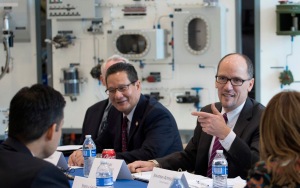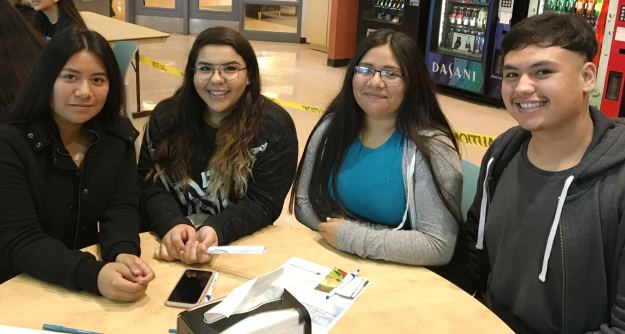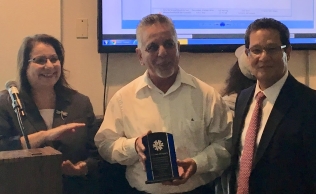
Pima Community College was honored to host a visit Jan. 29 by Secretary of Labor Tom Perez. Secretary Perez joined me, Tucson Mayor Jonathan Rothschild, Tucson Unified School District Superintendent H.T. Sanchez, PCC Board Chair Sylvia Lee and other PCC leaders on a tour of our Aviation Technology Center (ATC). Secretary Perez also attended an event at our Downtown Campus regarding health insurance options under the Affordable Care Act.
During the visit to the ATC, Secretary Perez learned about initiatives PCC is undertaking through Trade Adjustment Assistance Community College and Career Training (TAACCCT), which is administered by the Labor Department. In September 2014, PCC received a $2,499,997 grant under the fourth round of TAACCCT, which enables community colleges to work with industry to develop training and education programs that will lead to high skill-high paying jobs. As part of the grant, PCC is partnering with business to develop a degree pathway in Industrial Technology that includes four short-term certificates. PCC also is adding short-term options to existing degree programs in Welding and Aviation.
At ATC, Secretary Perez attended a roundtable discussion with a cross-section of government, education, industry and workforce leaders. The takeaway from the meeting was clear: Community stakeholders need to coordinate their efforts to advance Career and Technical Education (CTE) as a ticket to the middle class, and that investments such as those made through TAACCCT make a difference. Mayor Rothschild noted that women, minorities and military veterans are among the populations that could make great use of this valuable education.
Superintendent Sanchez emphasized that the focus in education has been weighted toward making students college-ready over making them career-ready. The value of CTE is borne out by data. As the Georgetown University Center on Education and Workforce has discovered,
43 percent of young workers with licenses and certificates earn more than those with an associate degree, 27 percent of young workers with licenses and certificates earn more than those with a bachelor’s degree, and 31 percent of young workers with associate degrees earn more than those with a bachelor’s degree.
I pointed out the need for a state and federal governmental framework that offers flexibility in student aid and allows educators to offer industry-driven programs that keep up with oft-dizzying pace of technological change.
Secretary Perez and the group did hear from a veteran, Ashley Rodriguez, who served as a Marine in Iraq before graduating from the Aviation Technology program and getting a job with Bombardier in Tucson. Rodriguez forthrightly described the roadblocks she had to overcome to go from the military to PCC and her new career. Secretary Perez summed up what we at PCC know about Ashley – “You’ve got game,” the secretary said – and said he would seek to find ways to straighten the pathway to civilian training that veterans must often travel.
Many employees made Secretary Perez’s visit to the ATC a success. Tom Hinman, Advanced Program Manager at the ATC, led an informative tour that included stops at the center’s two 727s. [PCC is one of the few U.S. programs with hands-on training on commercial and regional jets.] Tom’s team did a first-rate job with the logistics of a multifaceted event. Joanne Kingman, Program Manager in Workforce and Business Development, clearly explained the grant, sharing our best practices and highlighting our partnerships with industry.
Dr. Morgan Phillips, who as president of the Desert Vista Campus is responsible for the ATC, moderated the invigorating discussion. Government Relations Liaison Michael Peel reached out and brought together the community leaders for the valuable sit-down.
Secretary Perez has said that community colleges are the “secret sauce” of workforce development. I believe his visit confirmed that PCC’s wise use of the federal government’s investment in Career and Technical Education is improving the lives of individuals and contributing to economic development, and that the recipe for continued success demands that all stakeholders in the community continue to work together.




